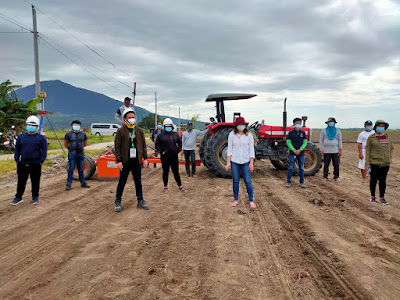In a Facebook post dated 03 October 2020 by the official FB account of the Rice Competitiveness Enhancement Fund (RCEF) of the Philippine Department of Agriculture, a variety of Green Super Rice called NSIC Rc 480 was able to almost double its maximum yield per hectare, from 4.4 tons to 8.3 tons, during the Palaysikatan Field Day of the Philippine Rice Research Institute (PhilRice) in Sto. Tomas, Davao Del Norte.
Pages
Wednesday, December 16, 2020
Monday, December 14, 2020
PRIME partners strengthen coordination and information sharing as project scales up
To ensure efficient rice crop health monitoring in the Philippines, the Pest Risk Identification and Management (PRIME) project conducted the National PRIME Annual Assessment (NPAA) Workshop on the 9th, 11th, and 25th of November 2020. The NPAA is an annual event that was conducted online this year and attended by representatives from the International Rice Research Institute (IRRI) and agencies of the Philippine Department of Agriculture (DA), mainly the Philippine Rice Research Institute (PhilRice), the Bureau of Plant Industry (DA-BPI), and Regional Field Offices (RFOs).
Thursday, November 26, 2020
IRRI and BAFE hold the first of a series of virtual training on laser land leveling
Training boosts expertise of Indonesian agricultural researchers in using seasonal climate prediction-based app
 |
| ICRR researchers participate from ICRR’s meeting room. ICRR also hosted the videoconferencing held via Zoom. Photo: Suhartini, ICRR |
West Java, Indonesia–Researchers from various agencies under the Indonesian Agency for Agricultural Research and Development (IAARD) participated in a face-to-face and virtual training in the development, operation, and maintenance of the Weather-rice-nutrient integrated decision support system (WeRise) from 16 to 20 November 2020. These agencies have been identified for the uptake and dissemination of WeRise in Indonesia (Bugayong, et al.).
Wednesday, November 11, 2020
Peer teaching approach helps learners become WeRise experts
Tuesday, October 13, 2020
Philippine rice straw project conducts virtual events for Filipino farmers
Thursday, October 1, 2020
IRRI mourns the passing of leading rice scientist Dr. Tamal Lata Aditya
Tuesday, September 8, 2020
WeRise in Indonesia: Delivering extension advisories effectively in the new normal
Medan, Indonesia - The International Rice Research Institute (IRRI), in partnership with the Assessment Institute for Agricultural Technology (AIAT) North Sumatra, conducted trainings for agricultural extension workers (AEWs) on delivering advisories to rice farmers through the Weather-rice-nutrient integrated decision support system (WeRise).
Monday, September 7, 2020
Myanmar invests in building skills in digital data collection
Digital transformation is gradually changing the operation in various sectors. To reduce the time and resources associated with collecting data and improving the data quality, digital data collection is a preferred fit for organizations that gather voluminous quantitative data.
Thursday, July 9, 2020
AMD and IRRI conducts training course on rice straw management amidst pandemic
 |
| U Soe Hlaing, DG of AMD, delivering the welcome message to the participants and staff of AMD. |
The Agricultural Development Support Project (ADSP) in Myanmar conducted its second rice straw management training using a blended training methodology of online lectures and practical field exercises on 22 June to 3 July 2020 in Yezin, Naypyidaw.
Monday, June 22, 2020
Laser-guided land leveling ramps up in Isabela
 |
| Engr. Eddie Rodriquez explaining to the farmers the procedure of LLL |
Isabela is the second biggest rice producer in the Philippines and one of the country’s highly mechanized provinces in rice production. With the threat to food security due to the COVID-19 pandemic, mechanization will take an even bigger role in ensuring that the country will have enough food.
Tuesday, May 12, 2020
Women farmers take a significant step towards seed security in Odisha
Monday, April 27, 2020
IRRI joins local communities in COVID-19 response via 3D printing
IRRI 3D printer printing face shield frame. Video by Claire Sandro.
To support the local government in making communities COVID19-free, the International Rice Research Institute (IRRI), through its Mechanization and Postharvest Cluster (MPHC), facilitated 3D printing services for several frontliners in Laguna, Batangas, and Mindoro, Philippines.
Wednesday, March 18, 2020
Rice Crop Manager now available as an Android application
RCM goes offline, recommendations now available without internet
Monday, March 16, 2020
German Minister of Economic Cooperation and Development visits APART, World Bank-funded IRRI project in Assam
Friday, March 13, 2020
Dr. Darshan Brar, leading IRRI breeder, passes away at 76
For 25 years from 1987 to 2012, Dr. Brar worked with his fellow scientists at the institute to broaden the gene pool of cultivated rice. With his expertise in genetics, plant breeding, and molecular cytogenetics, Dr. Brar successfully transferred novel genes from wild species of Oryza to cultivated rice, an important plant breeding approach that has revolutionized rice farming around the world.
Thursday, March 12, 2020
IRRI celebrates International Women’s Day in Odisha
08-March-2020 - In celebration of this year’s International Women’s Day, IRRI organized a one-day interactive meeting with forty women farmers at Khamanga Village in Khordha district of Odisha to discuss challenges and opportunities and to raise awareness on improved crop management practices.
Friday, March 6, 2020
IRRI celebrates the work of its women scientists
For International Women’s Day (08 March) and International Day of Women and Girls in Science (11 February), IRRI organized a week-long series of events to highlight the work of its women scientists and provide an opportunity for some of them to mentor young men and women.
New SEA rep pays courtesy call to Thai Rice Department Director General
Thursday, March 5, 2020
Participatory message design workshop to accelerate adoption of rice best management practices in Myanmar
The International Rice Research Institute (IRRI), through the Agricultural Development Support Project and CORIGAP project, organized a participatory message design workshop in Nay Pyi Taw on 25-27 February. Attended by 25 Department of Agriculture (DOA) staff, the workshop aimed to enhance their capacity in crafting user-friendly print and video materials to better communicate best management practices and technologies for rice production.
Thursday, February 20, 2020
Equipping women farmers to drive climate-resilient sustainable farming in Odisha
 |
| Women farmers trying their hand at the production of trichocards |
Friday, February 7, 2020
IRRI hosts plenary session Gobeshona Int’l Climate Conference in Dhaka
 |
| Dr. Ahmad Salahuddin from the IBO giving a presentation at a IRRI-hosted plenary session at the 6th Gobeshona International Climate Conference 2020 in Dhaka, Bangladesh. |
The theme for this year’s Gobeshona conference was “Research into action”. The event was organized by the International Centre for Climate Change and Development (ICCCAD) on the Independent University Bangladesh campus from 20-24 January 2020.
Thursday, February 6, 2020
IRRI welcomes new Executive Chairman of BARC
 |
| IRRI Bangladesh congratulates new Executive Chairman of Bangladesh Agricultural Research Council (BARC) at his office in Dhaka on 28 January 2020. |
Wednesday, January 22, 2020
Training aims to boost capacity and supply of high quality seeds of pulses and oilseed in Myanmar
The Department of Agricultural Research (DAR) and the Ministry of Agriculture, Livestock and Irrigation (MoALI), in collaboration with the International Rice Research Institute (IRRI), organized Training of Trainers on Early Generation Seed (EGS) production in pulses, oilseed crops including hybrid sunflower on 7-10 January 2020. The event trained 51 participants from the Department of Agriculture Seed Division, DAR Pulses and Oilseed Crops Section, and the private sector on the important methodologies of EGS production.
Friday, January 10, 2020
Former IRRI Executive Officer passed away
 |
| Faustino “Boy” Salacup poses for a portrait at his desk in IRRI. |
Faustino "Boy" M. Salacup (b. 1932), former Executive Officer, Comptroller, Treasurer, and Director for Protocol and Liaison of the International Rice Research Research Institute (IRRI), passed away on December 22, 2019. He is regarded as one of the Institute's pioneers, having joined in January 1961.

















